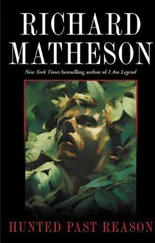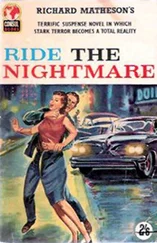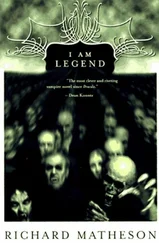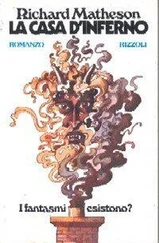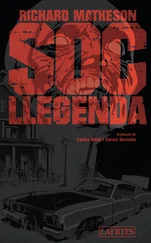“This is nothing,” was all he said.
I was not mistaken in my observation. His voice was less than it had been in Summerland. Clearly, the inertness of this place affected even speech. What did I sound like, I wondered?
“It’s getting cold,” I noticed then.
“Conceive of warmth around you,” Albert said.
I tried, discovering that, gradually, the cold became less harsh.
“Is it better?” Albert asked.
I said it was.
“Remember though,” he told me, “as we travel further, it will require more and more adaptive concentration on your part to adjust to the effects of the environment. A concentration which will grow harder and harder for you to command.”
I looked around, a new uneasiness beginning. “It’s getting dark now,” I said.
“Conceive of light around you,” Albert told me.
Conceive of light? I thought. I tried although I couldn’t understand how it could help.
It did however. Bit by bit, the shadows gathering about us started to lighten.
“How does it work?” I asked.
“Light, here, is obtained exclusively by the action of thought on the atmosphere,” he told us. “ Let there be light is more than just a phrase. Those who come to this realm in an unprogressed state are quite literally ‘in the dark,’ their minds not advanced enough to produce the light which would enable them to see.”
“Is that why they can’t go higher?” I asked, thinking uneasily of Ann. “Because they actually can’t see to find their way?”
“That can be part of it,” he said. “However, even if they could see with their eyes, their systems would be unable to survive in a higher realm. The air, for instance, would be so rarefied to them that breathing would be painful if not impossible.”
I looked around the bleak, unending countryside. “This could be called Winterland,” I said, the sight depressing me.
“It could,” he agreed. “Except that memories of winter on earth are, often, pleasant ones. Nothing here is pleasant.”
“Does your work here . . . succeed?” I asked.
He sighed and, glancing at him in the nocturnal light, I saw that his expression was one of melancholy; a look I’d never seen on his face before. “You know, from personal experience, how difficult it is to make people on earth believe in afterlife,” he said. “It is far more difficult here. The reception I’ve usually gotten is that of a naive church worker in the most vile of ghettos, my words greeted with scornful laughter, coarse jokes, verbal abuse of every kind. It isn’t hard to understand why so many dwellers in this realm have been here for ages.”
I looked at him with such dismay that he looked surprised, then, realizing what he’d said, suddenly repentant. Even he had lost perception here.
“I’m sorry, Chris,” he said. “I didn’t mean that Ann would be here that long. I’ve told you how long.”
He sighed again. “You see what I mean about the atmosphere of this place affecting one’s thinking. Despite what I believe, I’ve already let it work on my convictions. The larger truth, of course, is that every soul will eventually rise. I’ve never heard of any spirit being permanently abandoned no matter how evil. And your Ann is far from evil. All I intended to say is that there are misguided souls who have been in this realm for what amounts-to them at any rate-to an eternity.”
He said no more and I did not pursue it. I didn’t want to think of Ann being held here endlessly-or of myself a prisoner inside the lower realm.
Entry to dark thoughts

THERE WAS AN ODOR IN THE AIR; A SMELL WHICH I CAN ONLY describe as one of corruption.
Ahead lay what appeared to be a sprawling collection of hovels. I’d say a village but there seemed no arrangement to the shacks and huts. “What is this place?” I asked.
“A gathering place for those of similar nature,” Albert said.
“She isn’t-” I began to ask, then couldn’t finish, the idea too dismaying to voice.
“I don’t think so,” Albert answered.
I was going to say thank God when it occurred to me that where Ann was might be worse than this. I tried to resist the thought but was unable to dislodge it. I knew it was unjust to her but couldn’t help it, the baleful influence of the realm was affecting my mind.
There was no sound ahead as we approached the haphazard jumble of shanties. All I could hear was the scuffing of our shoes on the gray, flinty soil.
Off to our right, I saw some people moving aimlessly, others standing motionless, all dressed in shabby clothes. Who were they? I wondered. What had they done-or failed to do-that they should be there?
We walked within a few yards of a group of them; several men and women. Even though Albert had said he didn’t think that Ann was there, I found myself looking closely at the women. None of the people glanced at us as we passed. “Can’t they see us?” I asked.
“We’re of no interest to them,” Albert said. “They’re absorbed by their own concerns.”
I saw some people sitting on boulders and it gave me an odd sensation to realize that those boulders were created by their minds. They sat, heads bowed, hands hanging loosely, staring at the ground, immobile in their desolation. I know that, unless they were deaf, they heard us walking by but none gave any sign of noticing our presence.
Again, I found myself looking at the women. Don’t , I thought abruptly. She isn’t here . But Albert didn’t say that, came the sobering response. He said that he didn’t know. Was it possible? I thought, looking closer still.
We were so near to several of the people now that I could make out their features despite the gloom.
The sight made me catch my breath.
“Get used to it,” Albert said, “you’ll see worse.”
His tone seemed almost unsympathetic and I glanced at him, wondering uneasily if the place was changing him. If he were unable to resist it, what hope was there for me?
Shivering, I looked back at the people. Ann couldn’t be here; she couldn’t .
The features of the men and women were exaggerated, like those of acromegalics; not so much the faces of people as bloated caricatures of them.
In spite of my resolve, I looked intensely at the women. Was that Ann’s malformed face?
I fought it off. No! She wasn’t there!
“She isn’t here, is she?” I pleaded moments later, not strong enough to retain conviction.
“No,” he murmured and I exhaled long and hard.
We passed a young man lying on the ground, his clothing torn and stained by grime. I thought, at first, that he was looking at us, then realized, from the cast of his eyes, that his gaze was on his thoughts, a stare of withdrawn despondency.
I swallowed as I looked at his lost expression and the fetid air felt as though it were trickling down my throat like cold glue.
“Why do they look like this?” I asked, pained by the sight.
“One’s appearance retrogrades with one’s mind,” Albert answered. “The same thing happens on earth, people’s faces altering, over a period of time, with their actions and thoughts. This is only a logical-if terrible-extension of that process.”
“They all look so grim ,” I said.
“They are ,” he replied. “Grim in their preoccupation with themselves.”
“Were they- are they-all so bad?” I asked.
He hesitated before answering my question. Finally, he said, “Try to understand, Chris, when I tell you that this is nothing compared to what lies ahead. The people you see here may not be guilty of sins which were, in any way, horrendous. Even a minor transgression takes on darker aspects when one is surrounded by those who have committed similar transgressions. Each person multiplies and amplifies the failures of the others. Misery loves company , is what they say on earth. It should be: Misery, in company, grows ever worse .
Читать дальше




